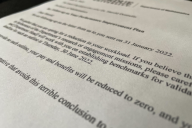You have /5 articles left.
Sign up for a free account or log in.
At the height of the financial crisis, it was unclear how diminished 401(k)s and general economic uncertainty would impact retirement trends for baby boomer professors. But new data suggest that professors are either significantly – or indefinitely – putting off retirement, and not just for financial reasons. Experts say the trend is forcing institutions to rethink traditional faculty models.
Some 74 percent of professors aged 49-67 plan to delay retirement past age 65 or never retire at all, according to a new Fidelity Investments study of higher education faculty. While 69 percent of those surveyed cited financial concerns, an even higher percentage of professors said love of their careers factored into their decision.
“While many would assume that delayed retirement would be solely due to economic reasons, surprisingly 8 in 10 -- 81 percent -- cited personal or professional reasons for delayed retirement,” said John Rangoni, vice president of tax exempt services at Fidelity. “Higher education employees, especially faculty, are deeply committed to their students, education and the institutions they serve.”
For the faculty boomers who will delay retirement due to professional reasons, 89 percent want to stay busy and productive, 64 percent say they love their work too much to give it up, and 41 percent are unwilling to relinquish continued access to – and affiliation with – their institution.
Of those who say they will delay retirement for economic reasons, 55 percent are unsure they have enough retirement savings, 42 percent want to maximize Social Security payouts and 42 percent believe they will need continued health insurance.
Reasons Professors List for Delaying Retirement
(Note: Those surveyed could list multiple reasons)
| Economic concerns (total) | 69% |
| --Unsure whether they'll have enough to retire comfortably | 55% |
| --Want to maximize Social Wecurity payments | 42% |
| --Will need to continue receiving health insurance benefits | 42% |
| Personal/professional reasons (total) | 81% |
| --Want to stay busy and productive | 89% |
| --Love the work too much to give it up | 64% |
| --Want continued access to and affiliation with institution | 41% |
The Fidelity data aligned with that gathered in a far more expansive study, the National Science Foundation’s landmark Survey of Doctorate Recipients, said Nicholas Wolfinger, associate professor of sociology at the University of Utah. Wolfinger and two co-authors used the longitudinal study, which has tracked 160,000 Ph.D.s in the sciences, social sciences and humanities through retirement since the effort began in the 1970s, to study higher education faculty retirement trends for their book Do Babies Matter? Gender and Family in the Ivory Tower. Of those subjects, only 28 percent had retired by age 65, he said, and those with kids generally retired later than those without.
Paul Yakoboski, senior economist with the TIAA-CREF Institute, also said the data align with those he’s published previously. Based on a 2011 TIAA-CREF study, just 15 percent of senior faculty expected to retire by normal retirement age (when they were eligible for full Social Security benefits, or 65 for most people). One-quarter of respondents wanted to retire by then, but expected to work longer. A much larger proportion – 60 percent – both expected and wanted to work past retirement age.
The Fidelity survey was conducted by an independent firm, Versta Research, earlier this year. Respondents included 195 full-time and part-time faculty who were eligible for full-time benefits at both public and private two- and four-year institutions.
Rangoni also said he was surprised that boomer faculty were confident in their retirement savings behavior, with 61 percent saying that they were confident educating themselves on investments and finance. But, he said, only 30 percent of boomer faculty have a formal investment plan for retirement savings. On average, boomer faculty had saved $423,853 for retirement.
Compared to corporate boomers also studied by Fidelity, higher education faculty plan to work past 65 in greater proportions (53 percent versus 74 percent, respectively). They also may be happier at work: 75 percent of corporate workers cited economic needs as reasons for working past normal retirement age, while 64 percent cited professional or personal reasons, compared to 69 percent and 81 percent, respectively, of higher education boomer faculty.
And there’s the rub, said experts in higher education faculty retirement trends. With no maximum retirement age for college and university professors, thanks to the 1994 end of the exemption of higher education from mandatory retirement laws (previously, colleges could require retirement at 70) and tenure, a happy professor could ostensibly keep working forever.
That’s not necessarily negative, as older professors can have deep institutional memory and much to offer their colleges and universities. Nonetheless, the idea of legions of aging professors is worrisome to people starting academic careers, to adjuncts longing for tenure-track slots and to some administrators, who already see this trend playing out on their campuses.
“This is not news to us,” said Kiernan Mathews, director of the Collaborative on Academic Careers in Higher Education at Harvard University, which studies the policies and programs used by colleges to effectively recruit and retain talented academics starting their careers.
“We conduct many informal consultations with provosts and presidents and for the last several months we’ve been asking them, ‘What keeps you up at night?’ ” A common response is that faculty are not retiring in the numbers that had long been anticipated, Mathews said.
That means delayed opportunities to reorganize the academic priorities of an institution and diversify its professoriate, he said. It also could hurt the chances of today’s new Ph.D.s of getting tenure-line jobs when “that bubble finally bursts,” likely in 10 to 15 years, due to higher education’s traditional bias towards “fresh” doctorates.
It threatens, too, to further erode the tenure-track system through accelerated employment of contingent faculty, Mathews said. “We’re hearing a much more common theme of, ‘How do we provide incentives to faculty to retire?’ ”
It’s not an easy question. For those senior faculty who wish to retire but plan on working past the normal age of retirement, financial incentives may work. But Yakoboski said money isn’t likely to entice “reluctant retirees,” who are driven to keep working primarily for psychosocial reasons.
The trend may force higher education to rethink traditional faculty models, Mathews said, to those beyond the “three-legged stool” of assistant, associate and full professor. One idea that’s gaining traction is making more meaningful the role of the emeritus professor, “making it an alternative to retirement that keeps faculty engaged, and we’re not losing that intellectual capital.”
Roger Baldwin, professor of educational administration at Michigan State University, has studied retired faculty organizations and a growing, more formalized subset of such groups called “emeritus colleges,” such as the one at Emory University. Although retired faculty organizations can vary in their levels of activity, they can be effective in giving professors a sense of purpose and identity following retirement, he said.
“I think many people are delaying retirement because there are no clear options as to how they’re going to continue an intellectually fulfilling life once they ‘drop off a cliff,’” he said. “That, coupled with the [recession of 2008], caused a lot of people to reassess retirement.”









